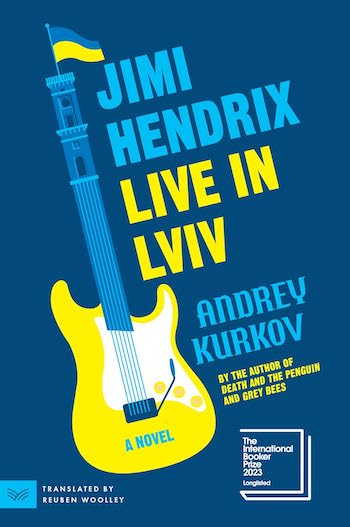Book Review: “Jimi Hendrix Live in Lviv” — Revisiting Lost Optimism
By Preston Gralla
A magical realist romp of a novel with a dollop of poignancy by the great Ukrainian writer Andrey Kurkov.
Jimi Hendrix Live in Lviv, by Andrey Kurkov. Translated by Reuben Woolley. 410 pp. Harper Collins, (paper) $15.99.
 Think of Ukraine and the last thing that might come to mind is Jimi Hendrix’s right hand buried in a cemetery in the country’s sixth largest city, Lviv. Or a cohort of aging hippies who gather at its graveside in a solemn, celebratory nighttime ceremony. Or a former KGB agent and Jimi Hendrix fan who targeted the hippies when he was with the Russian spy agency, but now joins them in their memorial. Or a Ukrainian everyman who makes his living driving kidney stone sufferers along cobblestoned streets late at night at just the right speed to disgorge their painful stones.
Think of Ukraine and the last thing that might come to mind is Jimi Hendrix’s right hand buried in a cemetery in the country’s sixth largest city, Lviv. Or a cohort of aging hippies who gather at its graveside in a solemn, celebratory nighttime ceremony. Or a former KGB agent and Jimi Hendrix fan who targeted the hippies when he was with the Russian spy agency, but now joins them in their memorial. Or a Ukrainian everyman who makes his living driving kidney stone sufferers along cobblestoned streets late at night at just the right speed to disgorge their painful stones.
But that’s what you get — and much more — in this magical realist romp of a novel with a dollop of poignancy by the great Ukrainian writer Andrev Kurkov. Originally published in 2012, 10 years before Russia’s invasion of Ukraine, it has only recently come out in English in the US, after being published last year in the UK and being longlisted for the Booker Prize.
Heavy ordnance tends to focus one’s mind — and a novel’s plot. One of Kurkov’s previous books, Grey Bees, began in a no-man’s land battleground between Russian-supported and Ukrainian forces. This book lacks that kind of narrative dynamite — it is a slower burn. The story begins in the Lviv cemetery where the aging hippies and former KGB agent bond over Hendrix’s buried hand 10 years after Ukraine seized independence from Russia after the breakup of the Soviet Union. (And no, in real life Hendrix’s hand isn’t buried there. But remember, we’re in magical realist territory here.)
The book’s varied cast of characters slowly make their meandering appearances in a braided story featuring mystery, magic, love, loss, and the sudden appearance of a Fender Stratocaster electric guitar lost in the mail for decades. A central plot gradually emerges: Terrifying seagulls bedevil the city even though Lviv is hundreds of miles from the sea. One of the aging hippies and the former KGB agent who stalked him team up to investigate and discover that a prehistoric Carpathian sea, buried beneath Lviv, may be returning. The pair save the city from possibly being drowned by its ancient past and rout the gulls.
With the appearance of that sea, Kurkov makes clear that he’s got other things on his mind than just an absurdist lark. What else is the sea coming back than the return of Russian domination after only little more than a decade of Ukrainian independence?
In those happier, more idealist days, it was reasonable to craft a magical-ish scenario in which two former adversaries — an aging hippie and a former KGB agent — manage to bar the return of a sinister past. This novel, with its “can’t-we-all-just-get-along” buoyancy, couldn’t be written today. Not after Russia’s brutal invasion, its targeting civilians with missile and bombs, its stealing Ukrainian children and shipping them to Russia, its gang rapes of Ukrainian women, its attempt not just to conquer Ukraine, but to wipe out its culture and language and pretend it never even existed.
So read Jimi Hendrix Live in Lviv not only for its exceptional writing (snappily translated by Reuben Woolley), madcap plot, and the surprisingly deeply felt emotions of its characters. Read it to revisit that lost optimism, and to imagine what could have been. And read it in the hopes that one day, with Russia defeated, the easygoing idealism it portrays might return to a nation that desperately needs it.
Preston Gralla has won a Massachusetts Arts Council Fiction Fellowship and had his short stories published in a number of literary magazines, including Michigan Quarterly Review and Pangyrus. His journalism has appeared in the Los Angeles Times, Dallas Morning News, USA Today, and Boston Globe Sunday Magazine, among others, and he’s published nearly 50 books of nonfiction which have been translated into 20 languages.
